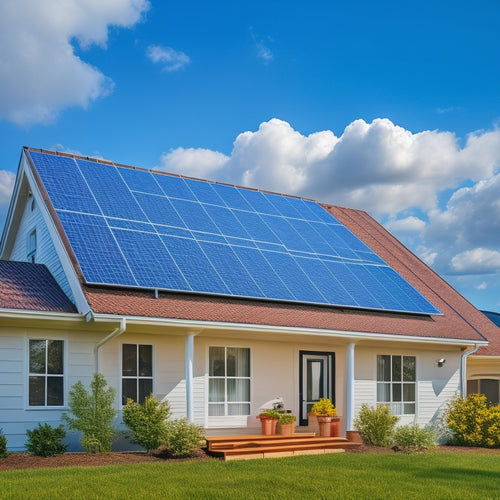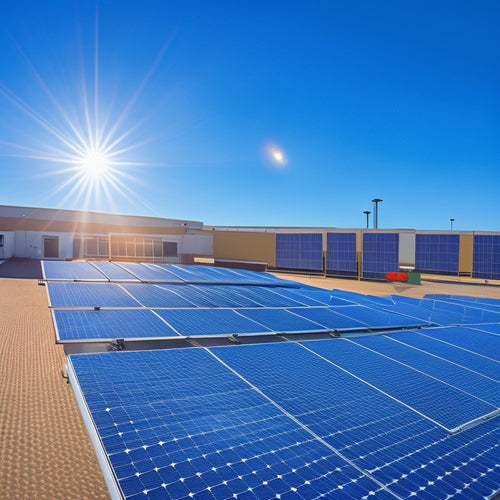
House Solar Panel Battery
Share
By installing a house solar panel battery, you'll gain control over your energy usage, reducing your reliance on utility companies and slashing your electricity bills. This renewable energy source provides a stable power supply, even during outages or rate hikes. With a deep cycle battery mode, you can optimize performance and extend the lifespan of your battery. Evaluating your roof's capacity and structural integrity are vital considerations for a successful installation. As you investigate the world of house solar panel batteries, you'll uncover the benefits of extended cycle life and how it can lead to significant long-term savings and energy independence - and that's just the beginning.
The Essentials
- A house solar panel battery provides energy independence, reducing reliance on utility companies and protecting against rate hikes and outages.
- Solar panel batteries significantly lower electricity bills by utilizing stored solar energy, leading to reduced monthly expenses and increased financial freedom.
- House solar panel batteries optimize performance with deep cycle battery mode, prioritizing battery maintenance to extend lifespan and maximize performance.
- Assessing roof capacity and structural integrity is crucial for successful solar panel installation, ensuring a secure and efficient energy storage system.
- A reliable house solar panel battery with an extended cycle life (up to 7,000 cycles) reduces maintenance and operational costs, providing a long-term energy storage solution.
Increased Energy Independence Guaranteed
You gain control over your energy usage with a house solar panel battery, which utilizes a renewable energy source to power your home.
By storing excess energy generated during the day, you reduce your reliance on the grid and can use it when you need it most.
With a home battery storage system, you can also lower your electricity bills by storing excess energy generated by your solar panels, reducing the amount of energy you need to purchase from your utility company.
This increased energy independence means you're less susceptible to utility rate hikes and outages, providing you with a sense of security and stability.
Renewable Energy Source
With the integration of a house solar panel battery, homeowners can now employ the power of renewable energy, greatly reducing their reliance on traditional energy sources and increasing their energy independence. This means you can capture the energy from the sun and store it for later use, reducing your carbon footprint and energy bills.
There are various solar panel types to choose from, each with its own benefits and drawbacks. Here's a comparison of some popular options:
| Solar Panel Type | Efficiency | Cost |
|---|---|---|
| Monocrystalline | 20-22% | High |
| Polycrystalline | 15-18% | Medium |
| Thin-Film | 7-14% | Low |
When it comes to energy storage, you'll need a battery that can efficiently store the excess energy generated by your solar panels. A house solar panel battery like the Tesla Powerwall or LG Chem RESU can provide up to 13.5 kWh of energy storage, allowing you to power your home during the night or on cloudy days.
Reduced Grid Reliance
By integrating a house solar panel battery, homeowners can considerably reduce their reliance on the grid, guaranteeing increased energy independence.
This reduced reliance is made possible by the energy storage capabilities of the battery, which stores excess energy generated by your solar panels during the day for use during the night or on cloudy days.
With the ability to utilize and store excess energy, you can finally say goodbye to the woes of rising energy bills and unreliable nighttime power home renewable energy systems.
By having a stable source of energy, you'll be less affected by grid outages and rate hikes.
You'll have a stable source of energy, even when the grid is unstable.
This increased energy independence means you'll be less reliant on the grid, reducing your energy bills and carbon footprint.
Moreover, a house solar panel battery can contribute to grid stability by reducing peak demand on the grid during periods of high energy usage.
By storing excess energy and feeding it back into the grid when needed, you'll be supporting the overall stability of the grid.
This not only benefits you but also the community at large.
Lower Electricity Bills Guaranteed
You're likely to see significant savings on your energy bills when you pair your solar panel system with a battery.
By storing excess energy generated during the day, you can cut energy costs now and reduce your reliance on the grid.
With an affordable solar battery backup system, you can enjoy reliable power at a lower cost.
This means you'll pay less for electricity each month, freeing up more room in your budget for other expenses.
Cut Energy Costs Now
Slash your energy expenses by installing a house solar panel battery, and start reaping the benefits of lower electricity bills immediately.
With a house solar panel battery, you'll be able to utilize the power of the sun and reduce your reliance on the grid. This means you'll be using clean, renewable energy to power your home, and cutting your energy costs in the process.
By leveraging advanced smart technology, you'll be able to optimize your energy efficiency and get the most out of your solar panel system. This technology allows you to monitor and control your energy usage in real-time, making it easy to identify areas where you can improve your energy efficiency.
By cutting energy costs now, you'll be taking an essential step towards achieving energy independence and reducing your carbon footprint.
With a house solar panel battery, you'll be in control of your energy usage, and on your way to a more sustainable future.
Reduce Monthly Expenses
With a house solar panel battery, your monthly expenses will take a significant hit, and for good reason.
You'll be generating your own clean energy, reducing your reliance on the grid, and slashing your electricity bills. This means you'll have more money in your pocket each month, giving you the financial freedom you desire.
By utilizing the power of the sun, you'll be able to offset a substantial portion of your energy consumption.
This translates to significant energy savings, which can be poured back into your budget planning. Imagine being able to allocate more funds towards the things that matter most to you, rather than lining the pockets of utility companies.
With a house solar panel battery, you'll be in control of your energy costs, enjoying predictable and stable expenses.
No more worrying about rate hikes or surprise bills. You'll be able to plan your finances with confidence, knowing exactly how much you'll be paying each month.
This peace of mind is priceless, and it's all thanks to the power of solar energy.
Deep Cycle Battery Mode
You're likely contemplating a deep cycle battery for your house solar panel system, which means you need to understand its performance in this mode.
When selecting a deep cycle battery, it's crucial to evaluate top-rated options like Tesla Powerwall and LG Chem, which offer reliable energy storage solutions.
A key aspect of deep cycle battery performance is its cycle life expectancy, or how many charge/discharge cycles it can handle before capacity degrades.
Another critical factor is the depth of discharge (DOD), which affects the battery's overall health and lifespan.
Cycle Life Expectancy
The lifeblood of any solar panel battery lies in its cycle life expectancy, which determines how many charge and discharge cycles it can handle before its capacity starts to degrade. You want a battery that can withstand the daily demands of charging and discharging without losing its performance. A high cycle life expectancy guarantees your battery remains efficient and effective over a longer period.
When it comes to your house solar panel battery, you should prioritize battery maintenance to optimize its performance. This means monitoring your battery's state of charge, confirming it's not overcharged or undercharged, and controlling the depth of discharge. By doing so, you can extend the lifespan of your battery and maximize its cycle life expectancy.
In deep cycle battery mode, your battery is designed to handle a higher number of charge and discharge cycles. This is ideal for off-grid systems or backup power applications where the battery is cycled daily.
Depth of Discharge
Understanding cycle life expectancy is critical to optimizing your house solar panel battery's performance, and it's closely tied to the depth of discharge (DOD). DOD refers to how deeply you're draining your battery with each cycle. A higher DOD means you're using more of your battery's capacity, which can affect its overall lifespan.
When you consistently discharge your battery to 80% or more, you're reducing its overall cycle life. This is because deep discharges cause more stress on the battery, leading to increased wear and tear.
On the other hand, limiting your DOD to 50% or less can greatly improve your battery's efficiency and lifespan. To achieve this, you'll need to monitor your discharge rates and adjust your energy usage accordingly.
By doing so, you can strike a balance between using your stored energy and preserving your battery's health. Remember, a deeper DOD may provide more power in the short term, but it'll cost you in the long run.
Optimize your DOD to guarantee your house solar panel battery operates at peak performance while maintaining its battery efficiency.
Check Your Roof's Capacity
You'll need to assess your roof's capacity to determine if it can support a solar panel system.
First, consider the roof's size and shape, as these factors will impact the number of panels you can install.
Moreover, you'll need to perform a structural integrity check to guarantee your roof can handle the added weight of the panels and home battery systems that will store excess energy generated by your solar panels.
In addition, consider the roof's orientation and exposure to sunlight, as these factors will affect the system's overall efficiency.
Moreover, you'll need to perform a structural integrity check to guarantee your roof can handle the added weight of the panels and battery.
Roof Size and Shape
Evaluating your roof's capacity is essential in determining how many solar panels it can accommodate, and roof size and shape play a significant role in this evaluation.
You need to take into account the total available roof space, factoring in any obstacles like skylights, vents, or chimneys. A larger roof generally means more space for solar panels, but it's not the only factor.
You should also assess your roof's orientation, as a south-facing roof receives the most sunlight and is ideal for solar panels.
A shading analysis is also important to determine the amount of shade your roof receives from trees, neighboring buildings, or other obstructions. This will help you identify the best areas for solar panel placement.
Additionally, evaluate the shape of your roof, as a complex or multi-angled roof may require more specialized installation.
Structural Integrity Check
Before installing a house solar panel battery, it's vital to verify that your roof can support the added weight and stress of the solar panels. This structural integrity check is imperative to guarantee a safe and successful installation.
You'll need to assess your roof's capacity to handle the weight of the solar panels, mounting hardware, and the battery system.
Check your roof's construction, material, and age to determine its load-bearing capacity. Confirm that your roof is free from damaged, rotten, or missing shingles, and that the underlying structure is sound.
You may need to consult with a structural engineer or a professional roofer to evaluate your roof's condition.
The installation requirements for your solar panel battery system will depend on your roof's capacity. You may need to reinforce your roof or modify the installation design to accommodate the added weight.
Maintenance considerations, such as regular inspections and cleaning, will also play a significant role in guaranteeing the longevity of your solar panel system.
Longer Lifespan Than Competitors
You're likely aware that a solar panel battery's lifespan is critical to its overall value.
When comparing options, you'll find that our house solar panel battery offers an extended cycle life, meaning it can handle more charge and discharge cycles before its capacity starts to degrade.
This translates to a longer lifespan than many competitors, making it a more reliable choice for your energy storage needs.
Extended Cycle Life
Most solar panel batteries on the market typically last around 3,000 to 5,000 charge cycles, but our House Solar Panel Battery is designed to exceed that standard, boasting an extended cycle life of up to 7,000 cycles.
This means you'll enjoy a longer lifespan from your investment, with fewer replacements needed over time. Our advanced battery technology is engineered to optimize charging efficiency, reducing wear and tear on the battery.
This, in turn, minimizes the need for frequent battery maintenance, saving you time and resources. With an extended cycle life, you'll experience fewer interruptions to your energy supply, ensuring your freedom from grid reliance remains uninterrupted.
By choosing our House Solar Panel Battery, you're investing in a reliable, long-term solution that will keep your home powered for years to come.
Our commitment to quality and innovation means you can trust our battery to deliver consistent performance, no matter the circumstances.
Frequently Asked Questions
Can I Use Solar Panels and Batteries With My Existing Electrical System?
You can integrate solar panels with your existing electrical system, but it's essential to guarantee seamless solar panel integration and optimize battery efficiency to avoid grid tie issues, allowing you to utilize renewable energy freely.
How Often Should I Maintain My Solar Panel Battery System?
You should maintain your solar panel battery system regularly to maximize its lifespan; perform monthly checks on connections and electrolyte levels, and annual deep-cycle tests to guarantee peak performance and extend its lifespan.
Are Solar Panel Batteries Compatible With All Roof Types?
You might assume that solar panel batteries work with any roof, but research reveals that's not entirely true. In reality, you'll need to guarantee your roof type meets specific installation requirements, such as structural integrity and compatibility with mounting systems.
Can I Add More Batteries to My System in the Future?
You're free to scale up your system as needed, and adding more batteries in the future is definitely possible, allowing you to increase your battery capacity and accommodate system expansion without worrying about limitations.
Are Solar Panel Batteries Eligible for Government Incentives?
You're wondering if you can cash in on sweet government incentives for your battery investment. The answer is yes, you're eligible for tax credits and rebates, which can greatly enhance your battery savings, giving you more freedom to soak up the sun's energy.
Final Thoughts
You're about to reveal the secret to utilizing the sun's power like Apollo riding his chariot of fire. With a house solar panel battery, you'll break free from the shackles of grid dependence and ride the waves of energy independence. Your electricity bills will plummet like a falling star, and your battery will keep on giving, cycle after cycle, like the eternal phoenix.
Related Posts
-

Cost of Solar Panel Installation
You can expect to pay between $15,000 and $30,000 or more for a typical solar panel installation, depending on the sy...
-

Smart Grid Technology Implementation Challenges
You'll encounter several challenges when implementing smart grid technology, particularly in cost management, scalabi...
-

Essential Solar Panel Mounts for Commercial Properties
When it comes to essential solar panel mounts for your commercial property, durability and wind resistance are key fa...


